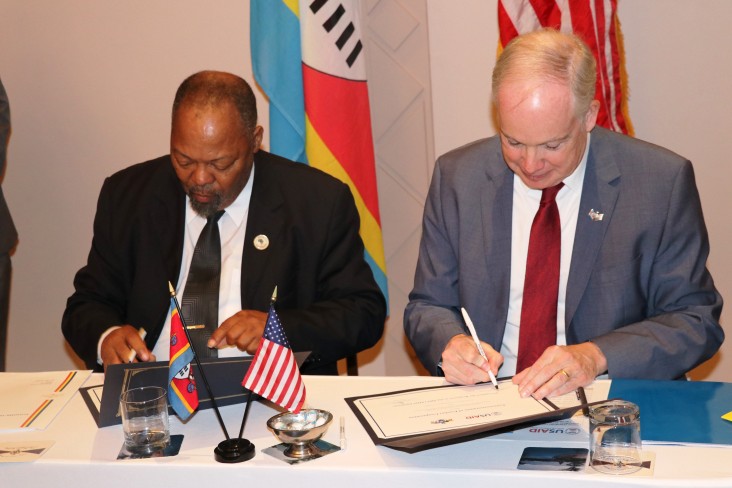Speeches Shim

Honorable Minister of Economic Planning and Development, Dr. Gina;
Honorable Minister of Health, Senator Lizzy Nkosi;
Honorable Minister of Finance, Neil Reinkenburg;
Honorable Ambassador Lisa Peterson;
Principal Secretaries;
Director of NERCHA, Khanya Mabuza;
USAID country team;
Government Officials;
Members of the Press and Distinguished Guests;
Sanibonani
It is a great honor to be here today on this remarkable day to reaffirm the partnership between the United States Government and the Government of the Kingdom of Eswatini.
As USAID Southern Africa’s Mission Director, I am excited about the new five-year bilateral grant agreement, the Development Objective Agreement - also known as the DOAG. This agreement provides the framework for USAID’s funding of activities in Eswatini. The majority of USAID’s work in Eswatini focuses on the multi-sector HIV response and is funded through the United States’ President’s Emergency Plan for HIV/AIDS Relief (PEPFAR).
Under this bilateral agreement, the United States plans to make available up to 225 million U.S. dollars to combat HIV/AIDS in Eswatini over the next five years. The funds will be used to support the multi-sector response to HIV and deliver high quality, life-saving treatment and prevention services; but more importantly, will continue to support strengthening Eswatini’s multi-sector, health, social, and community systems, and to build civil society and private sector capacity as implementing partners in the HIV response.
We have already seen tremendous progress in the last few years as many people affected by HIV have better access to treatment. The 2016 Swaziland HIV Incidence Measurement Survey 2 (SHIMS2) found a 44 percent reduction in new infections among adults since the 2011 results due to collective efforts between the Government of the Kingdom of Eswatini and its partners, including the United States Government through PEPFAR.
Recently, I heard a story of a Swati man who was afraid to tell his wife that he was HIV positive. So much so, that he threw away his pills! When our partner, The Luke Commission, realized he wasn’t on treatment, they asked to visit the man’s home and counselled his family. His wife accepted the diagnosis and is continuing to support him. She and their baby tested negative for HIV and she was accordingly educated about and referred to Pre Exposure Prophylaxis until her husband is virally suppressed. It is stories like this that make me so proud of the work we are doing together. Going above and beyond to make sure that the people of Eswatini are reached with comprehensive HIV services, stay on treatment and prevent new infections. Quite simply, together we are saving lives.
While Eswatini is among the top tier countries to achieve the UNAIDS 90-90-90, we know that the final stretch, finding people who do not yet know their HIV positive status, and initiating them on treatment, along with preventing new infections remains a difficult challenge. Given Eswatini’s youth bulge, adolescents and youth are priority populations for HIV services. It is imperative that activities supported under this new agreement work to expand our collective partner base. Globally, PEPFAR is on a path towards transitioning more of its support to government, para-statals and local institutions, civil society organizations and the private sector. Expanding this partner base in Eswatini will ensure that achievement and gains made in HIV services are sustained.
To reach marginalized and rural populations and to expand community-based services provided through community-based organizations is critical. Private-sector engagement can contribute to greater scale, efficiency, and more value for money. One example is a partnership with Coca-Cola and the Matsapha Town Council to improve access to Health and HIV services through mobile and outreach in Matsapha and surrounding areas with an aim to improve the health and productivity of the workforce. Matsapha, the industrial hub, attracts a young and mobile population who are looking for work. The partnership has strategically packaged services to make them accessible to the populations who need them at times and places that are most convenient.
Globally, U.S. PEPFAR is on a path towards transitioning its supported activities to government, civil society organizations, and the private sector to ensure that achievement and gains made in HIV services are sustained. USAID is reorienting the way it does business towards supporting each country on its Journey to Self-Reliance -- or, put another way, its ability to address its own development challenges.
With today’s signing of the DOAG comes an opportunity and a platform for both governments to engage at policy and strategic levels with the goal of jointly defining this journey to self-reliance and how best USAID can offer support to meet Eswatini’s development challenges. USAID will continue to support and partner with Eswatini to ensure that it progresses forward in terms of development through not only our health programs, but also our programs that focus on youth, energy, and trade.
We wish Eswatini and our partners all the best in this new cycle of development.
Ngiyabonga, Thank you!

Comment
Make a general inquiry or suggest an improvement.